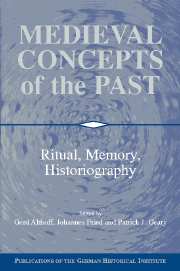Book contents
- Frontmatter
- Introduction
- 1 Authority and Legitimation of Royal Policy and Action: The Case of Henry II
- 2 King Henry II of Germany: Royal Self-Representation and Historical Memory
- 3 The Variability of Rituals in the Middle Ages
- 4 Rebels and Rituals: From Demonstrations of Enmity to Criminal Justice
- 5 Oblivion Between Orality and Textuality in the Tenth Century
- 6 Text and Ritual in Ninth-Century Political Culture: Rome, 864
- 7 The Concept of Time in the Historiography of the Eleventh and Twelfth Centuries
- 8 Constructing the Past by Means of the Present: Historiographical Foundations of Medieval Institutions, Dynasties, Peoples, and Communities
- 9 Topographies of Memory: Center and Periphery in High Medieval France
- 10 Challenging the Culture of Memoria: Dead Men, Oblivion, and the “Faithless Widow” in the Middle Ages
- 11 Artistic and Literary Representations of Family Consciousness
- 12 The Strange Pilgrimage of Odo of Deuil
- 13 The Rhineland Massacres of Jews in the First Crusade: Memories Medieval and Modern
- 14 The Martyr, the Tomb, and the Matron: Constructing the (Masculine) “Past” as a Female Power Base
- Index
5 - Oblivion Between Orality and Textuality in the Tenth Century
Published online by Cambridge University Press: 05 January 2013
- Frontmatter
- Introduction
- 1 Authority and Legitimation of Royal Policy and Action: The Case of Henry II
- 2 King Henry II of Germany: Royal Self-Representation and Historical Memory
- 3 The Variability of Rituals in the Middle Ages
- 4 Rebels and Rituals: From Demonstrations of Enmity to Criminal Justice
- 5 Oblivion Between Orality and Textuality in the Tenth Century
- 6 Text and Ritual in Ninth-Century Political Culture: Rome, 864
- 7 The Concept of Time in the Historiography of the Eleventh and Twelfth Centuries
- 8 Constructing the Past by Means of the Present: Historiographical Foundations of Medieval Institutions, Dynasties, Peoples, and Communities
- 9 Topographies of Memory: Center and Periphery in High Medieval France
- 10 Challenging the Culture of Memoria: Dead Men, Oblivion, and the “Faithless Widow” in the Middle Ages
- 11 Artistic and Literary Representations of Family Consciousness
- 12 The Strange Pilgrimage of Odo of Deuil
- 13 The Rhineland Massacres of Jews in the First Crusade: Memories Medieval and Modern
- 14 The Martyr, the Tomb, and the Matron: Constructing the (Masculine) “Past” as a Female Power Base
- Index
Summary
In a recent book, I attempted to examine the means by which European communities transmitted and redefined their remembered pasts in the tenth and eleventh centuries. I argued that the period of roughly 950 to 1050 saw a great amount of “creative forgetting” as individuals and communities, both lay and secular, readjusted their sense of a relationship to the past, creating a new and more useful memory through a process of transmission, adaptation, and suppression. In that study I concentrated primarily on written traditions and examined how a wide spectrum of texts were restructured and transformed in the process of creating a useful past.
A number of scholars have criticized my work, and rightly so, for not having explored in more detail the specific issues of orality in the context of remembering. The position I took in the book was that, in the period I studied, the relationship between orality and literacy was a complex one. The rememberers moved between the two worlds with great facility: Oral tradition might be called on to validate or interpret written tradition, and written tradition might incorporate much that had been oral. Thus, I saw orality and literacy so deeply intertwined that I did not believe it necessary to devote a separate discussion to oral transmission of the past. I still think that this is essentially correct, but I recognize that I could have provided more concentrated attention to the issues of explicitly oral transmission within what Ursula Schaefer and others term vocality, taking into account the work of Hanna Vollrath, Horst Wenzel, and others who have examined the parameters of orality in medieval society.
- Type
- Chapter
- Information
- Medieval Concepts of the PastRitual, Memory, Historiography, pp. 111 - 122Publisher: Cambridge University PressPrint publication year: 2002
- 5
- Cited by



